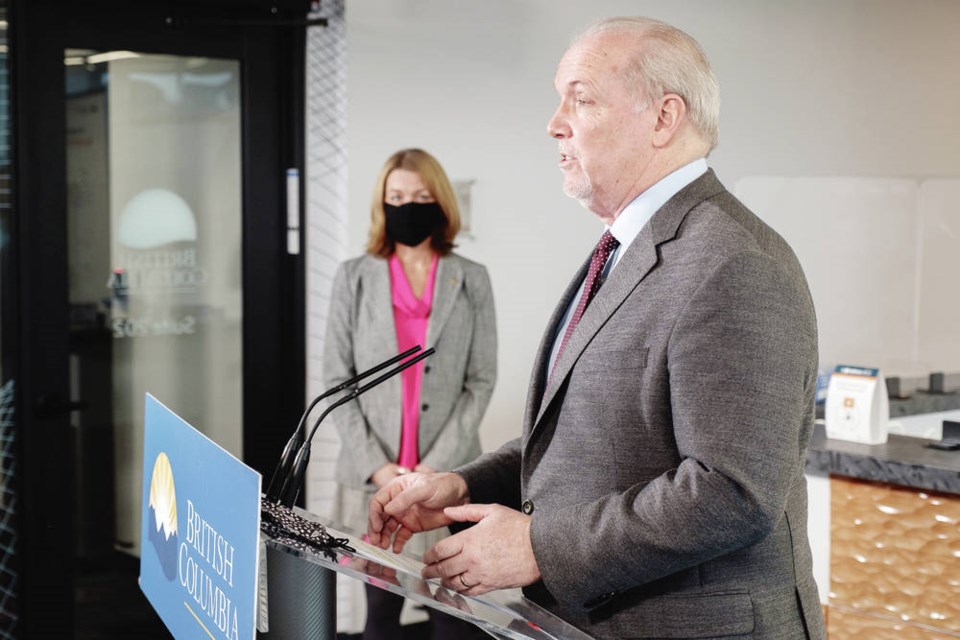On the heels of two COVID-related deaths of young adults amid an outbreak in Cowichan Tribes in Duncan, Premier John Horgan says he will ask the First Nation’s leaders what more can be done.
The Cowichan Tribes, which includes about 2,000 people living on reserve and another 1,000 in the immediate area, received 600 doses of vaccine last month, and is awaiting delivery of 600 more next week for second doses. A recent outbreak resulted in 209 cases — of which 195 have now recovered — and three deaths. More testing on reserve is planned.
“I will certainly be reaching out to talk to the leadership,” said Horgan in a media availability on Thursday. “If there’s any more we can do, we will.”
Health officials are working to meet COVID-19 challenges not just in Cowichan and on the Island, but in the Interior and northern regions, “where we’ve seen unacceptable increases in cases, particularly in Indigenous communities,” Horgan said.
Derek Thompson, assistant general manager for Cowichan Tribes, said a shelter-at-home order remains in place until March 5, and the recent deaths remind people everywhere to abide by the provincial health officer’s orders to stay at home, work at home, practice physical distancing, wear a mask, wash their hands and get tested if they have any symptoms.
The biggest issue now for leaders in his community, the largest single First Nation in B.C. with about half living on reserve, is the uncertainty around vaccine delivery, said Thompson.
“If we can determine some certainty around that rollout, I think all of us British Columbians — including Cowichan Tribes — will feel that much more confident about the broader scope around the directives, restrictions and orders to protect everybody against COVID-19,” said Thompson.
Second doses were supposed to arrive Feb. 22 and are now “anticipated” to arrive on Feb. 24, for example, said Thompson. That may sound like minor delay, but setting up a vaccination clinic for second doses involves notifying and scheduling 600 people, putting nurses in place, requesting more Island Health nurses which are in high demand, arranging for screening and cleaning, and more.
“We’re needing in the neighbourhood of anywhere between 50 and 60 staff on site every day to do the rollout of those vaccines,” said Thompson. “In term of timing and logistics, we just need a little more lead time. We’re getting days’ notice as opposed to a number of weeks’ notice.” Any delays in vaccines from the province also push back plans the First Nation has for its broader vaccine rollout.
Vaccines promised to the federal government have been delayed by both Pfizer-BioNTech and now Moderna, causing a faltering start to Canda’s COVID-19 vaccine rollout affecting the same plans of provinces and territories and First Nations communities.
The federal government has pledged six million doses that will be available by the end of next month, said Horgan, but until that regular flow of vaccine resumes, it’s a challenge to announce a plan and schedule clinics. For example, if the province schedules 80-year-old residents for vaccinations based on expected supply “and the supply doesn’t show up, that disrupts our vaccination plan and we’re concerned about that — not overly concerned at this point, but if this continues for a few more weeks then we’ll be in a critical situation.”
Provinces and territories relied on the federal government to sign contracts and secure vaccines as the most efficient way to proceed.
“I understand the frustration, not just the Cowichan Tribes, but people across British Columbia, are feeling,” said Horgan. “We were given advice that vaccines would be on the way, and they haven’t arrived.”
B.C. Health Minister Adrian Dix is expected to meet with Calgary-based Providence Therapeutics about its development of an mRNA COVID-19 vaccine still in its first clinical trials.
Dix is meeting with Providence to see what they can offer “not in the short term, but in the long term,” said Horgan, noting it’s a topic of conversation between all premiers and leaders.
Manitoba Minister Brian Pallister signed the first deal with Providence, for two million doses, and Horgan expects Alberta Premier Jason Kenney will be next.
“There’s no vaccine approved for development in Canada or use in Canada, so we’ve got a long way to go before we’re in a position to take on domestic supply,” said Horgan.
However, if vaccine shortages persist and domestic supply becomes available, B.C. “will be at the front of the line with others trying to get as much as we can to meet the needs of BCers.” said Horgan.
ceharnett@timescolonist.com



